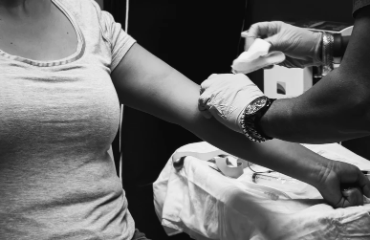
posted
on 1/6/2021
in
BLOGS from St. Anthony
For millions of Americans, January is a time of reevaluation, taking control of your health, and setting goals. In fact, regaining control of your health whether it’s getting in shape, eating healthier, or exercising is the top most common New Year’s resolution. Your health is no doubt important, but have you ever thought about what you can do for others? I’m sure you’ve heard the phrase, blood donation saves lives, and there’s proof in the numbers. 4.5 million Americans will need a blood transfusion each year. 43,000 pints: the amount of donated blood used each day in the U.S. and Canada. Someone needs blood every two seconds. Only 37 percent of the U.S. population is eligible to donate blood - less than 10 percent do annually.
January is National Blood Donor Month. Due to increased seasonal illnesses during the winter months and inclement weather conditions, donations of blood and platelets decline, and demand increases. Here are some facts, according to Life Serve Blood Center.
There’s No Substitute for Human Blood
Blood is living tissue that cleans and nourishes the human body while also fighting infections, healing wounds, and performing many other vital functions for the human body. It is a fragile substance that cannot be manufactured and can only be stored for a very limited time. There is no substitute for blood. Donors are the only source of blood for patients who need it.
Blood can be separated into various components: red blood cells, white blood cells, plasma, and platelets. Each component serves a different purpose for the human body. Red cells, white cells, and platelets, made in the marrow of bones, fight infection, carry oxygen, and help control bleeding. Plasma functions as a carrier for blood cells, nutrients, enzymes, and hormones throughout the body.
Transfusions by the Numbers:
- Cancer Patients: can use up to 8 units of blood a month.
- Bone Marrow Transplant: can use up to 2 units a day.
- Cardiovascular Surgery: can use between 2-25 units.
- Liver Transplant: can use up to 100 units.
- Auto/Trauma Accident Patients: can use up to 50 units
With the worldwide COVID-19 pandemic, it’s more important than ever to be mindful of not only your health but others. Donating plasma or more specifically Convalescent Plasma, is just one way to help. Here’s how to be considered.
What is Convalescent Plasma?
The U.S. Food and Drug Administration (FDA) authorized convalescent plasma therapy for people with coronavirus disease 2019 (COVID-19). The FDA is allowing its use during the pandemic because there's no approved treatment for COVID-19.
Blood donated by people who've recovered from COVID-19 has antibodies to the virus that causes it. The donated blood is processed to remove blood cells, leaving behind liquid (plasma) and antibodies. These can be given to people with COVID-19 to boost their ability to fight the virus.
Donate Convalescent Plasma
To be considered as a convalescent plasma donor, the following criteria must be met:
- Donor received a positive COVID-19 test, a positive COVID-19 antibody test, or had a suspected case of COVID-19
- A donor is 100% recovered and at least 14 days out from symptoms
- Donor weighs at least 120 pounds
- Donor is at least 16 years of age
- If female, donor has never been pregnant*
There is no denying the changes the world is going through with the pandemic. Health is still very much at the forefront as we turn the page and begin a new year. Donating blood or Convalescent Plasma is just one way to help others during this crisis. St. Anthony Regional Hospital takes the COVID-19 pandemic seriously and is doing everything we can to ensure the safety of all our patients and guests. Learn more at our website or Facebook page, or give us a call at 712-792-3581.
Sources:
Filter
- blog
- donate blood
- lifeserve blood center